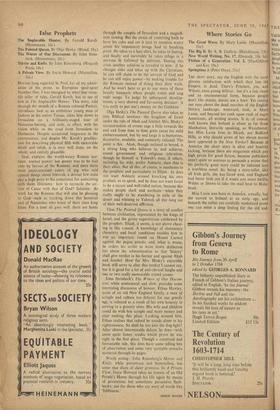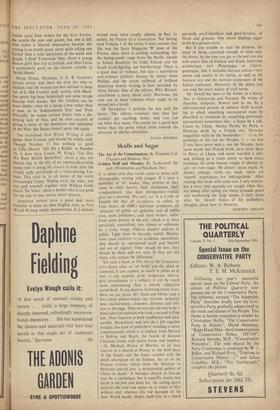Where Stories Go
Springtime 3. (Peter Owen, 21s.)
Tue short story, say the English with the same gloomy satisfaction with which they lost the Empire, is dead. There's Pritchett, yes, and Wilson, even young Sillitoe: but it's a lost cause and an uncommercial form, because people don't like stories, stories are a bore. Yet raising our eyes above the dead marches of the English literary landscape, westward, look, is Mary Lavin, and beyond her rank upon rank of eager Americans. all writing stories. It is, of course, well known that Ireland is about as far from Manhattan, literarily speaking, as Westchester, but Miss Lavin lives in Meath, not Bedford Hills, so why should seven of her eleven storks have appeared in the New Yorker? Because in America the short story is alive and heartily kicking, because there are magazines which pay high prices for good fiction, because publishers aren't quite so anxious to persuade a writer that his perfectly good story could be tinkered into a worthless novel. So, being a story-teller, like all Irish girls, she has faced west, and England had better look out if it wants any more Swifts. Wildes or Shaws to take the mail boat to Holy- head.
Miss Lavin was born in America, actually, but she moved to Ireland at an early age, and beneath the rather too carefully modulated prose one can sense a deep feeling for the old sod.
Unlike some Irish writers for the New Yorker, she avoids the cute and quaint, but one is left with rather a blurred impression because the writing is so evenly good, never quite taking one further than a mild enjoyment of the scene and people. I liked 'Lemonade' best, about a young Boston girl's first trip to Ireland, and Miss Lavin is particularly good on the islands, notably m 'Bridal Sheets.'
Moon Dance, Montana, is A. B. Guthrie's private corral, and there the men are men or chicken, and the women are best advised to keep out of it. Old Frontier stuff, mostly, with Black- feet pretty big heap balderdash and some simple humour with skunks. But Mr. Guthrie can be more subtle; when he is being a boy rather than a man, as in 'Independence Day' and 'First Principle,' he makes serious points with a dis- arming lack of fuss, and he does succeed in giving a sense of the desolation and splendour of the West. But Destry doesn't quite ride again.
The revitalised New World Writing is alto- gether New Frontier and should be widely read. Though Number 17 has nothing as good as Tillie Olson's 'Tell Me a Riddle' in Number 16, it does have Louise W. King's 'The Day We Were Mostly Butterflies,' about a too, too ghastly day in the life of an interior-decorating queen who is doing his utmost to look after the simply daffy girl-friend of a truck-driving Les- bian. This story is, in all senses of the word, screamingly funny. Wiping away the tears, you can pull yourself together with William Gold- man's 'Da Vinci,' about a barber who is too good for his job, or two stories about doctors.
American writers have a good deal more material to draw on than English ones, as New World Writing amply demonstrates. It is demon-
strated even more amply, almost, in fact, to satiety, by Fiction of a Generation. Not having read Volume 1 of the series, I must assume that this was the Story Magazine 'B' team of the Ponies, since there is nothing outstanding, but the backgrounds range from the Pacific islands to Italian Brooklyn via Utah, Ireland and the South (cock-fighting, not bus-burning). There is a good deal of violence, but also a marvellous anti-violence political fantasy by James Atlee Phillips, and the recent outbreak of brilliant American Jewish writing is here heralded by Alma Denny. One of the editors, Whit Burnett. contributes a story about early Mormons, the only one in these volumes which ought to be turned into a novel.
Of Springtime 3 perhaps the less said the better. The editors complain that they just couldn't get anything better, and you can see what they mean. The poems are a good deal better than the prose which tends towards the dreariest of old-hat surrealism.
JULIAN MITCHELL



































 Previous page
Previous page